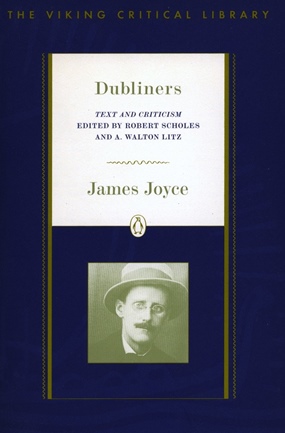Description
This Vintage Classics edition of James Joyce’s groundbreaking story collection has been authoritatively edited by scholars Hans Walter Gabler and Walter Hettche and includes a chronology, bibliography, and afterword by John S. Kelly. Also included in a special appendix are the original versions of three of the stories as well as Joyce's long-suppressed preface to Dubliners.
With the fifteen stories in Dubliners Joyce reinvented the art of fiction, using a scrupulous, deadpan realism to convey truths that were at once blasphemous and sacramental. Whether writing about the death of a fallen priest ("The Sisters"), the petty sexual and fiscal machinations of "Two Gallants," or of the Christmas party at which an uprooted intellectual discovers just how little he really knows about his wife ("The Dead"), Joyce takes narrative art to places it had never been before.
About the Author
A profound influence of literary innovations of Irish writerJames Augustine Aloysius Joyceon modern fiction includes his works,Ulysses(1922) andFinnegans Wake(1939).Sylvia Beachpublished the first edition ofUlyssesof James Augustine Aloysius Joyce in 1922.People note this novelist for his experimental use of language in these works. Technical innovations of Joyce in the art of the novel include an extensive use of interior monologue; he used a complex network of symbolic parallels, drawn from the mythology, history, and literature, and he created a unique language of invented words, puns, and allusions.John Stanislaus Joyce, an impoverished gentleman and father of James Joyce, nine younger surviving siblings, and two other siblings who died of typhoid, failed in a distillery business and tried all kinds of other professions, including politics and tax collecting. The Roman Catholic Church dominated life of Mary Jane Murray, an accomplished pianist and his mother. In spite of poverty, the family struggled to maintain a solid middle-class façade.Jesuits at Clongowes Wood college, Clane, and then Belvedere college in Dublin educated Joyce from the age of six years; he graduated in 1897. In 1898, he entered the University College, Dublin. Joyce published first an essay onWhen We Dead Awaken, play ofHeinrich Ibsen, in theFortnightly Reviewin 1900. At this time, he also began writing lyric poems.After graduation in 1902, the twenty-year-old Joyce went to Paris, where he worked as a journalist, as a teacher, and in other occupations under difficult financial conditions. He spent a year in France, and when a telegram about his dying mother arrived, he returned. Not long after her death, Joyce traveled again. He left Dublin in 1904 with Nora Barnacle, a chambermaid, whom he married in 1931.Joyce publishedDublinersin 1914,A Portrait of the Artist as a Young Manin 1916, a playExilesin 1918 andUlyssesin 1922. In 1907, Joyce published a collection of poems,Chamber Music.At the outset of the Great War, Joyce moved with his family to Zürich. In Zürich, Joyce started to develop the early chapters ofUlysses, first published in France because of censorship troubles in the Great Britain and the United States, where the book became legally available only in 1933.In March 1923, Joyce in Paris startedFinnegans Wake, his second major work; glaucoma caused chronic eye troubles that he suffered at the same time.Transatlantic reviewofFord Madox Fordin April 1924 carried the first segment of the novel, called part ofWork in Progress. He published the final version in 1939.Some critics considered the work a masterpiece, though many readers found it incomprehensible. After the fall of France in World War II, Joyce returned to Zürich, where he died, still disappointed with the reception ofFinnegans Wake.
